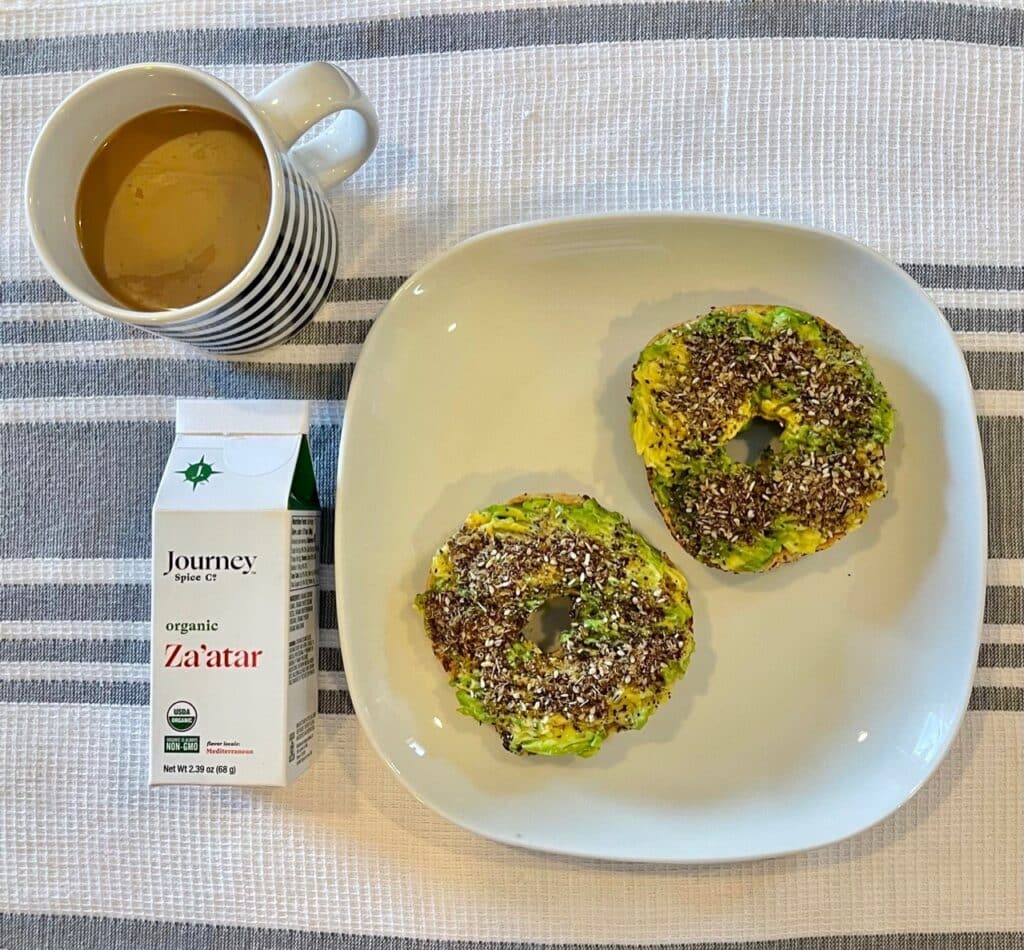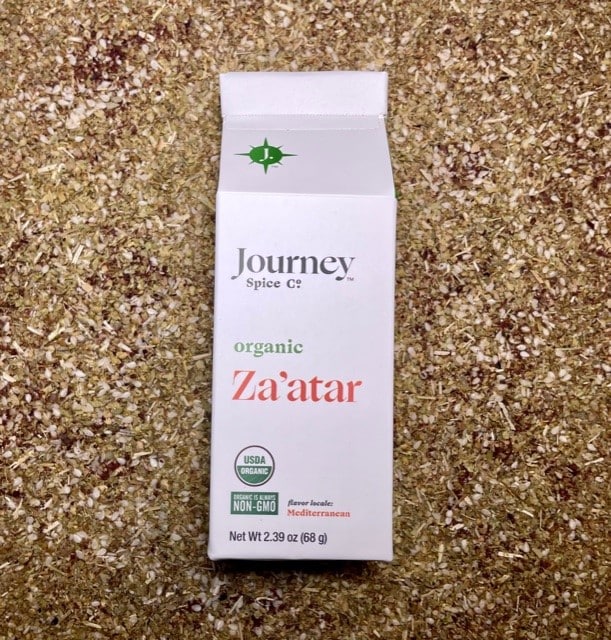

What is Za’atar Spice Seasoning?
One of our favorite ways to use our Organic Za’atar spice seasoning (sometimes spelled zaatar, zatar, zahtar, or atar) is on avocado “toast,” where we mash avocado on a toasted everything bagel. We then add some coarse-ground black pepper for a bit of a kick and our Journey Spice Co. Organic Za’atar.
So, What is Za’atar Spice Seasoning Anyway?
So, what is za’atar seasoning? If you do not know, it is basically the Middle Eastern and Mediterranean version of everything bagel seasoning. It can be used in much the same way in cooking, baking, and sprinkling over many foods. Like everything bagel seasoning, no two versions of za’atar seasoning are alike. When creating our za’atar seasoning, we spent a lot of time researching the different varieties on the market, and the variations in ingredients, textures, and flavors seemed almost infinite. There is no “official” way to make za’atar. A tremendous variation in how za’atar seasoning is made is seen throughout the Mediterranean region, both in restaurants and households.
Za’atar Should Contain Ground Sumac
Although there is no “official” way to make za’atar, there do seem to be some general “rules” that make a za’atar seasoning a za’atar seasoning and not some other type of seasoning. For example, the inclusion of ground sumac berries seems like a fundamental “rule” when making za’atar. However, we have seen even huge brands omit sumac, opting to use perhaps less expensive ingredients like citric acid instead to achieve the tangy flavor that za’atar is known for. Our Organic Za’atar uses high-quality organic sumac, which is the first ingredient listed (meaning the most prominent ingredient).
Za’atar Should Contain White Sesame Seeds
Another significant “rule” is including white sesame seeds in the blend. Some brands choose to toast their sesame seeds. We use organic white sesame seeds, but we do not toast them. Why? Two reasons. The first reason is that toasting sesame seeds reduces their shelf life because the toasting process alters the internal structure of the seed’s fat, making the seeds more prone to becoming rancid. Indeed, we have tasted a few competitive (we will not name names) versions of za’atar that toast their sesame seeds that have a strange “off” taste and smell. The second reason is that za’atar is often used in baking and cooking. This means that sesame seeds that have already been toasted are at risk of becoming overdone once they are essentially cooked or baked for a second time.
To Add Hyssop, or Not to Add Hyssop —That Is the Question
Another “rule” is the addition of thyme or hyssop. Many traditionalists claim that hyssop is actually more “official” than using thyme. What is hyssop? Hyssop is a wild herb from the thyme family that is only grown in the Mediterranean region. We tried both thyme and hyssop when we were creating our Organic Za’atar. Using ground hyssop over thyme seemed like the clear winner because it has a less bitter, brighter, slightly minty, and interestingly complex flavor compared to thyme. A lesser but relatively common “rule” is using other herbs like oregano and marjoram. Using other herbs like this largely depends on regional tastes, of course.
So Many Preferences, So Many Variations
Beyond these “rules” for making za’atar, many other things seem left up to preference. We have seen many other ingredients used in za’atar seasonings, like cumin, coriander, fennel seed, and the list goes on and on. We have seen some versions of za’atar that use ground wheat, which we believe is just a cheap filler. As the saying goes, you often get what you pay for, right? Another reasonably common ingredient includes oils like olive oil, sunflower oil, and other vegetable oils. We chose not to use oils in our Organic Za’atar because we found that it tasted better without them. We also believe that the addition of oils that do not seem to add a real purpose to a seasoning are really just there as cheap fillers to increase product weight.
Salty? Finely Ground? Chunky?
While many versions of za’atar use salt, we do not because, like all of our products, we like to give people control over how much salt they add to their meals, especially since many seasonings seem to have way too much salt. Indeed, salt was the only thing we could taste when trying several competitive brands of za’atar! Also, many competitors use a ton of salt in their products as another cheap way for their products to achieve a higher weight. Some versions of za’atar finely grind all ingredients except for the sesame seeds. We have seen some versions that even grind the sesame seeds. Other versions of za’atar are less finely ground, where you will see the dried herbs more intact. Our Organic Za’atar is somewhere in between.
